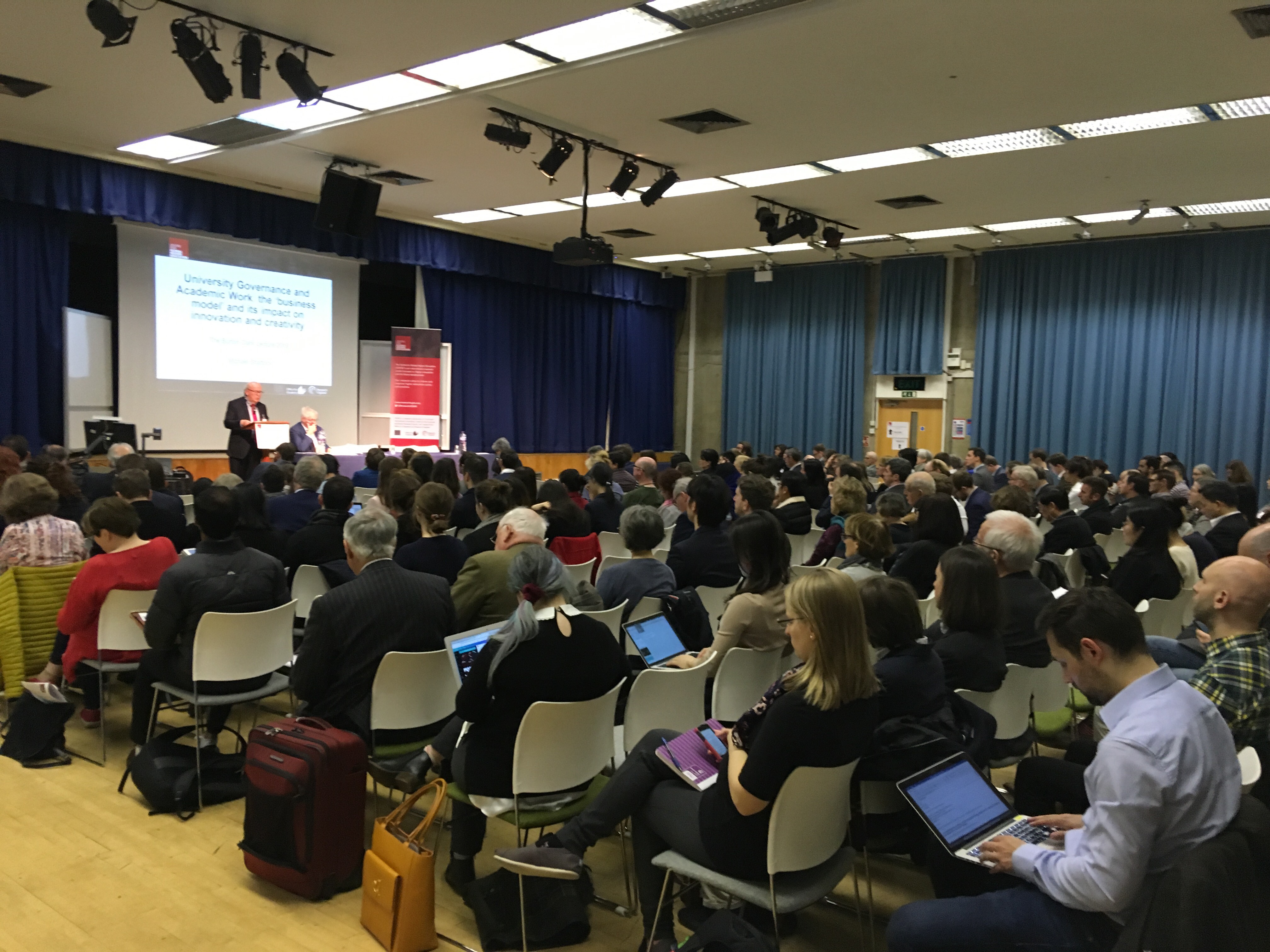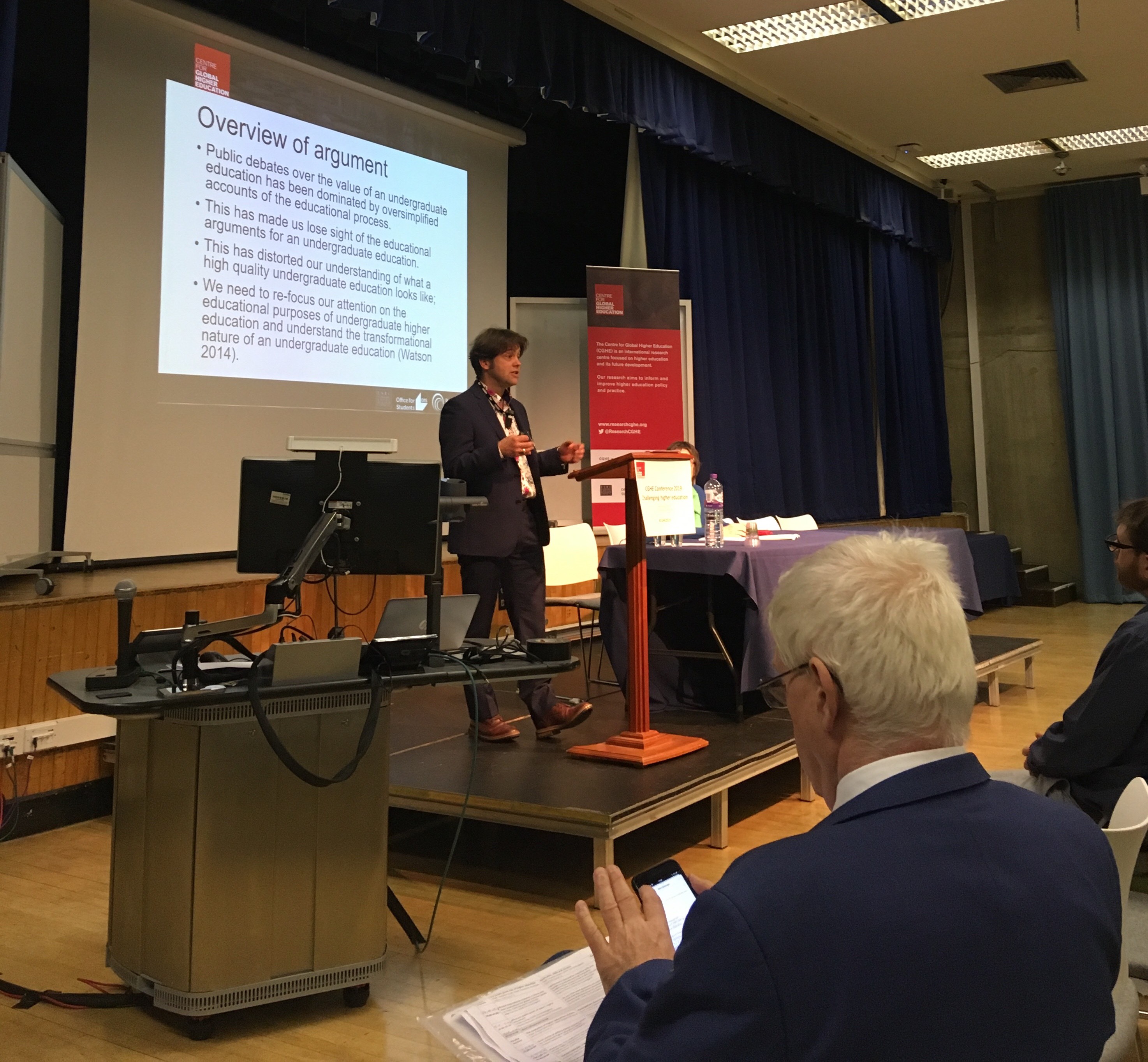Higher education challenged at 2019 CGHE annual conference
The fourth annual CGHE conference took place in London last week, gathering CGHE academics from across the globe to present their latest research findings, as the norms of global higher education were scrutinised.

Professor Michael Shattock delivers the 2019 Burton R Clark lecture on higher education
More than 270 delegates headed to the UCL Institute of Education in London to hear the presentations on the theme of ‘challenging higher education’.
The event was opened by CGHE director Professor Simon Marginson, who detailed that research is international by its nature, and despite Brexit Britain, we need a world of bridges as we build towards the future.
Starting the formal lectures was the 2019 Burton R Clark lecture on higher education, given this year by Professor Michael Shattock, on the impact of the ‘business model’ on innovation and creativity.
Shattock discussed how public policy towards higher education lays great stress on the importance of innovation and creativity to the nation’s economic and social future. He then examined how far this is reflected in changes in university governance and the governance of the system in contemporary UK higher education.
You can read the full transcript from Professor Michael Shattock’s lecture here.
Following this, a panel discussion was held on the impact of Brexit on higher education, with UCL’s Jeffery Hall swelling as attendees arrived to hear a topical discussion on the biggest political issue facing the country today.
Chaired by CGHE’s Professor Ellen Hazelkorn, Universities UK International’s Jamie Arrowsmith, QS’ Dr Ludovic Highman, HEPI’s Nick Hillman and David Palfreyman from the University of Oxford’s New College, tackled the divisive subject.
You can read more about Nick Hillman’s view of the panel discussion in his HEPI blog here.
On a learning curve
After lunch, the second keynote was delivered by Professor Marijk van der Wende, who looked at the new realities for higher education in a changing global context. Professor van der Wende provided a European perspective on challenges to higher education: “You [Britain] are not alone… In Europe and the US, higher education is challenged by the same political trends.”
“Greetings from the continent!” Professor van der Wende opens her keynote
However, van der Wende closed by quoting Carel Stolker, President and Rector, Leiden University who stated: “If history has taught us anything, it is that out of conflict comes collaboration. Brexit won’t hold back science because the challenges the world faces are bigger than the fights between nations and it is in everyone’s best interest to work together.”
For the afternoon, the conference split into three parallel sessions, under the themes: the public good role of higher education; graduates, skills and careers; and between the global, regional, national and local.
During these sessions, Dr Lin Tian presented on the inward international students in China and their implications for global common goods. You can read Tian’s recent working paper on this topic here. Elsewhere, Professor Vassiliki Papatsiba and Professor Marginson presented on the emotional impact of Brexit in higher education.
The second set of parallel sessions addressed the evolution of higher education sectors; participation, financing and equity; and governance, management and academic work in a more unstable environment.
These presentations included Dr Stephen Hunt on market exits of higher education providers. You can read the working paper he produced with Professor Vikki Boliver on the topic here. Elsewhere, Associate Professor Celia Whitchurch and Dr Giulio Marini presented their research into the academic workforce, and their working paper with Professor William Locke can be found here.
Teaching in universities today
The day ended on a high note, as Professor Paul Ashwin gave the third and final keynote on transforming university teaching. Ashwin detailed the oversimplification of the higher education process, and the rhetoric of generic skills: “Oversimplified thinking about higher education learning and teaching undermines the higher education system and its function to society,” he said.
You can read an abridged transcript from Professor Paul Ashwin’s lecture here.

Professor Paul Ashwin delivers the third keynote of the day
Marginson closed the day by thanking speakers, attendees and organisers, before looking ahead to the prospect of the next CGHE annual conference. We hope to see you all there next year.
For presentation slides and a recording of the day’s livestream, head here.
Eileen Kennedy and Diana Laurillard were unable to present at the CGHE conference, so produced this video presentation on ‘Research on Learning Design for Open Online Collaboration’ instead.

